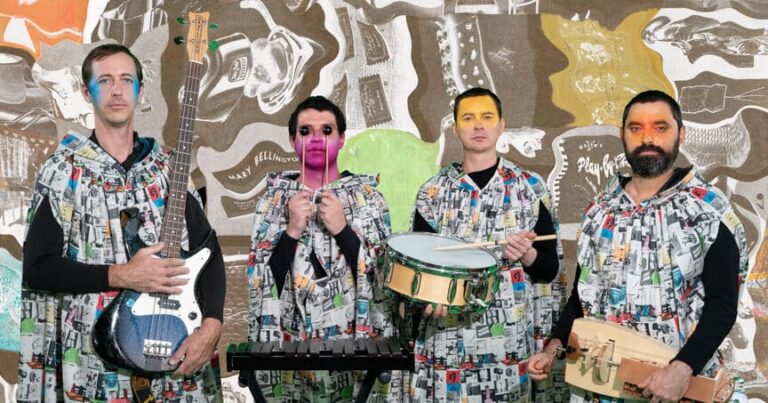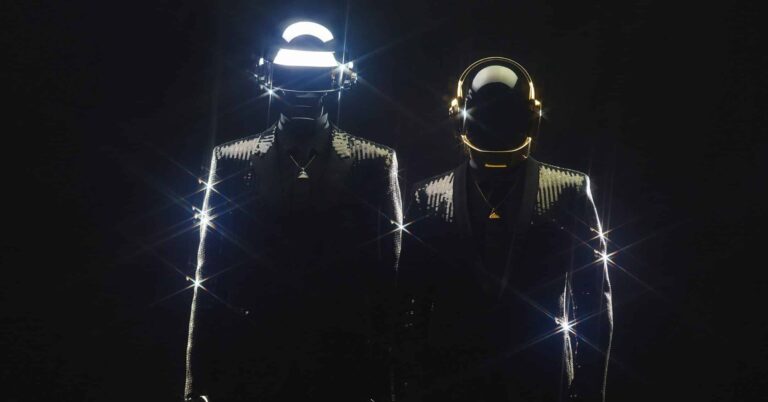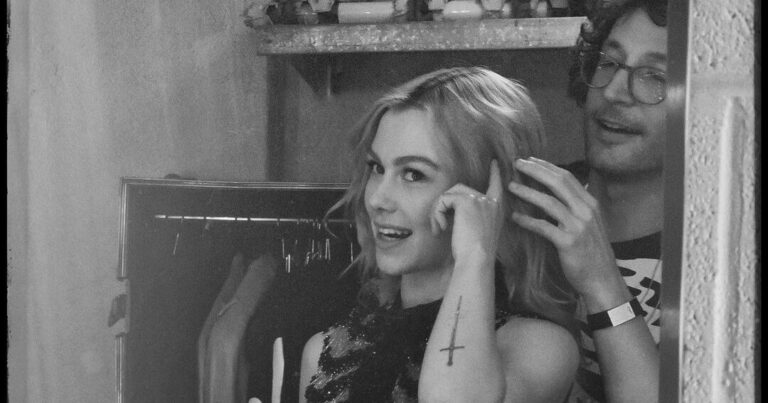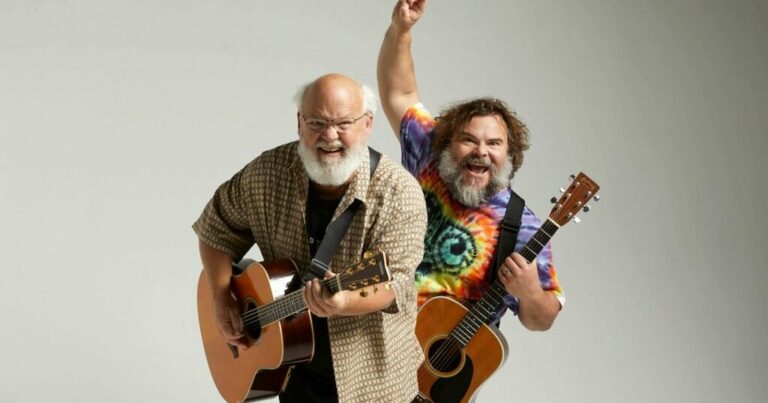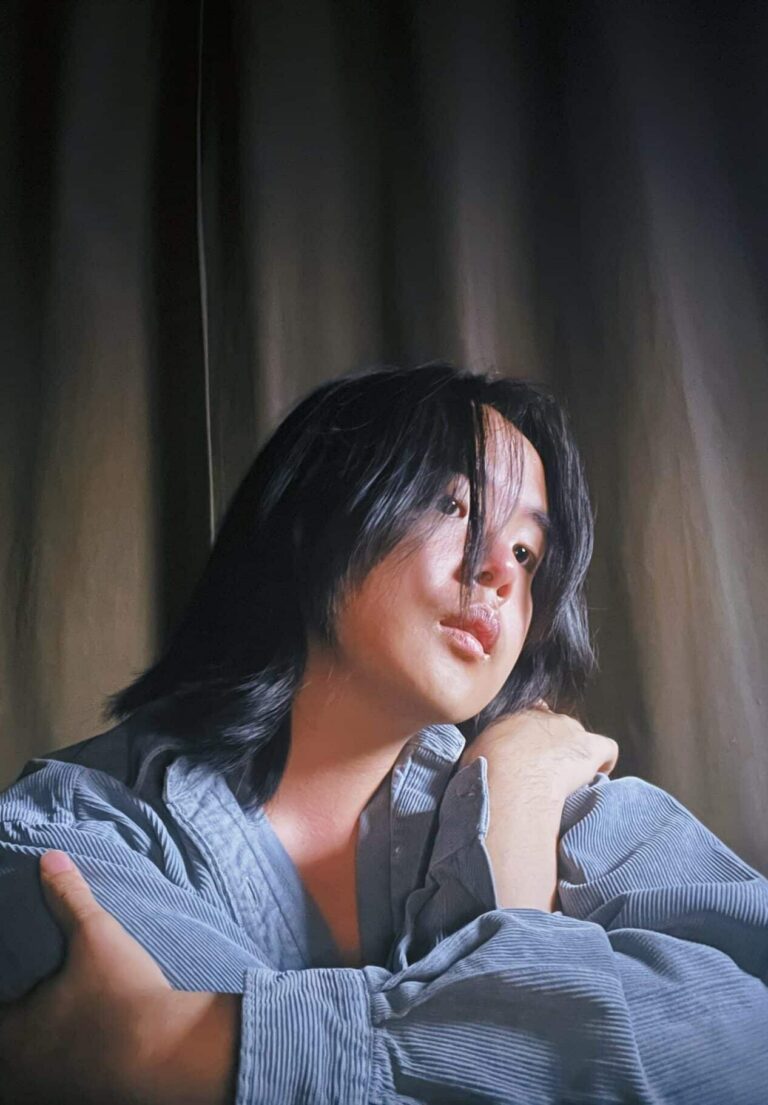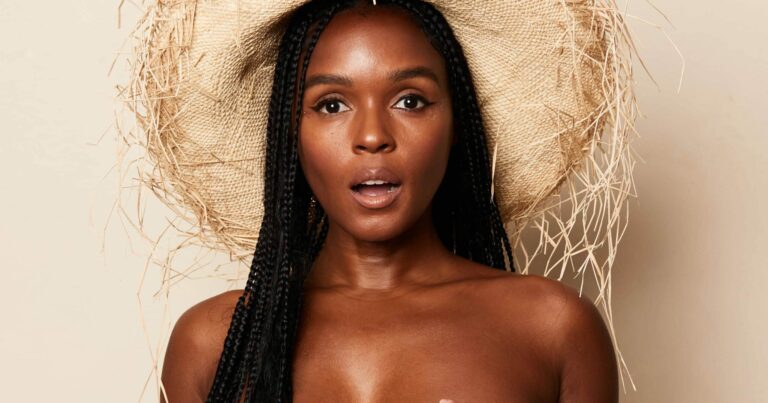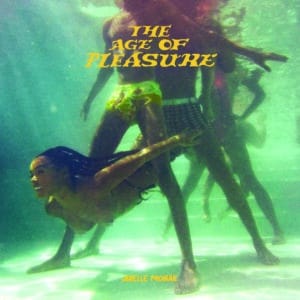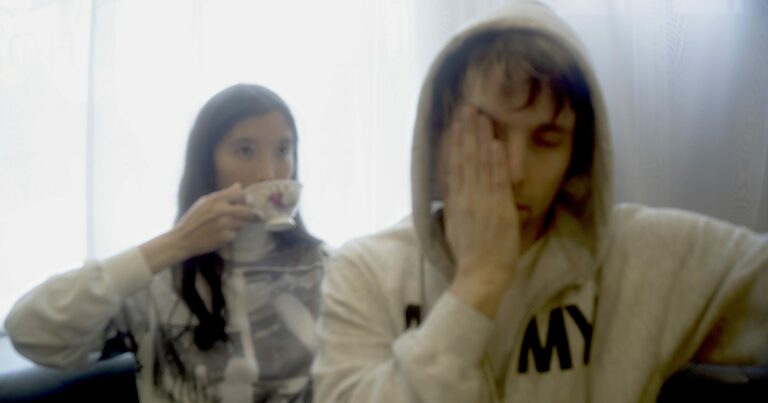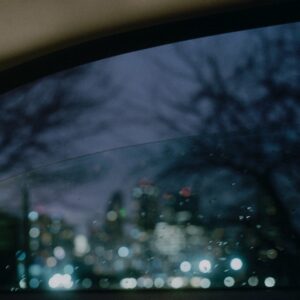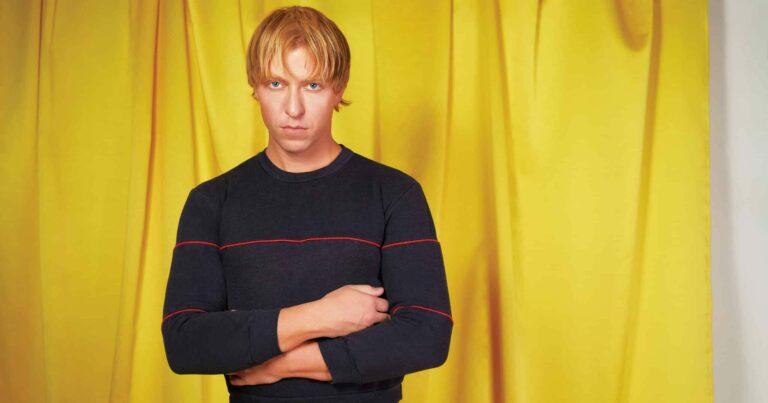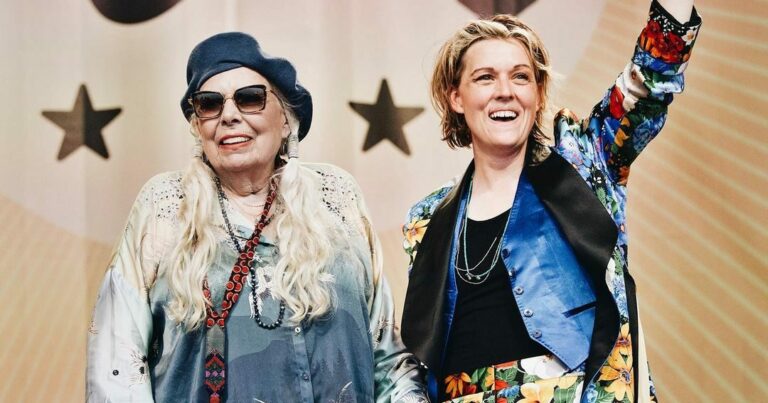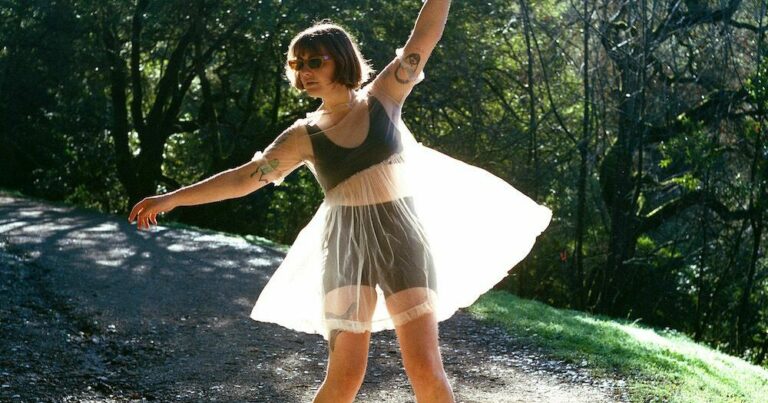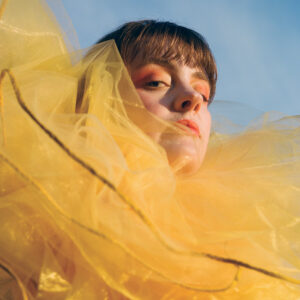Animal Collective have today reissued their debut album, Spirit They’re Gone, Spirit They’ve Vanished, via Domino. Along with remastered audio and new artwork by Abby and Dave Portner, the new edition includes the A Night at Mr. Raindrop’s Holistic Supermarket EP, which features five previously unreleased tracks. These include ‘Untitled #1’, which they unveiled earlier this year, as well as a cover of Fleetwood Mac’s ‘Dreams’, which was recorded during the same era and mixed by Animal Collective’s Deakin. Take a listen below.
Listen to Daft Punk’s Previously Unreleased Track ‘Infinity Repeating’ Featuring Julian Casablancas and the Voidz
Daft Punk have released the 10th anniversary edition of Random Access Memories, which includes 35 minutes of unreleased music. Ahead of its arrival, the group shared the documentary track ‘The Writing of Fragments of Time’ as well as an early version of ‘Give Life Back to Music’. Among the previously unreleased tracks is ‘Infinity Repeating’, a 2013 demo of a collaboration with Julian Casablancas and the Voidz that premiered at the Pompidou Center in Paris on Thursday. Listen to it along with the full deluxe album below.
Phoebe Bridgers Joins Rob Moose on New Song ‘Wasted’
Rob Moose has teamed up with Phoebe Bridgers for a new track, ‘Wasted’, which Bridgers has been performing live for years. It’s set to appear on Moose’s upcoming EP Inflorescence, which features the previously released ‘I Bend But Never Break’, a collaboration with Alabama Shakes’ Brittany Howard. Check out both singles below.
Moose and Bridgers have previously collaborated on Bridgers’s albums Punisher and Stranger in the Alps, as well as the Copycat EP. Inflorescence, which also includes contributions from Bon Iver’s Justin Vernon, Sara Bareilles, and Emily King, is out August 11 via Sony Masterworks.
Tenacious D Return With New Single ‘Video Games’
Tenacious D have returned with a new song called ‘Video Games’. Produced by John Spiker, the band’s first new song in five years is about how Jack Black doesn’t play video games anymore, then goes on to list titles like God of War, Red Dead Redemption 2, and Fallout 4. It comes with an animated video created by OneyPlays, and you can check it out below.
“It’s about growing up and leaving childish things behind…” the band said of the song in a statement. “But then realizing that video games are more than just mindless toys….in fact they can be a true expression of huge ideas that belong in the pantheon of great works of art! It’s about time someone defended the honor and integrity of this bold new horizon. Leave it to the greatest band in the world…Tenacious D!!!”
Tenacious D’s last album, Post-Apocalypto, arrived in 2018.
Artist Spotlight: Lucy Liyou
Lucy Liyou is a Korean-American composer who grew up playing classical piano competitively for many years. After experimenting with different kinds of music during college, she released her debut album, Welfare, in 2020. The record – which drew inspiration from childhood memories, Korean folk opera, and Korean drama soundtracks while combining text-to-speech readings, field recordings, manipulated electronics, and more – was reissued in May 2022 by American Dreams along with a sister LP, Practice, that Liyou made within a two-week period while staying at her parents’ home in Seattle. Partly because she didn’t have access to her MIDI keyboard, Practice saw her reincorporating lush acoustic piano, an instrument that also features prominently on her latest LP, Dog Dreams (개꿈), out Friday. Capturing the artist’s recurrent dreams with striking immediacy, the album serves as a love letter to the self, documenting experiences that are often deemed, from the outside, as nonsensical, while embracing their ineffability. At once tender and daring, the three compositions trace the wounds and desires of a body in search of direction, looking to make the subconscious a little more tangible. Instead of drowning the voice, all the elements that permeate it – trauma, romance, whimsy, desperation – ultimately swell towards a certain form of clarity.
We caught up with Lucy Liyou for the latest edition of our Artist Spotlight series to talk about her piano background, documenting dreams, the ideas behind her new album, and more.
As a young person, did any of your daydreams revolve around making music? What do you remember about them?
The answer is absolutely, but I think my understanding of what making music was changed drastically throughout the years when I was younger. Before, I thought making music was literally just making sound happen; playing the piano, playing these pieces that I was learning. I was a piano student. And then that evolved and changed as I listened to other kinds of music, expanded my listening horizons, and realized that there’s something called songwriting, and there’s something called production, there are these ideas of arrangement that go beyond just the right hand, left hand on the piano. And then there’s something called making something of your own. I’ve been daydreaming it my whole life, but I’ve been daydreaming very “different things” that summed up in one entity of just music in general. But it started off as just playing what I was learning and finding ambition and excitement and learning new kinds of pieces, and then moving towards something that felt like, “Oh, this is my own. This is something that I’m creating for myself.”
Is there an element of the piano that is still attached to childhood in your mind?
Definitely. And I think a lot of that really has to do with the approach to it. Three years ago, when I put out Welfare / Practice, I was doing my best to stay away from the piano as much as possible, because I felt like it was almost like a crutch. I wanted to explore this form of p’ansori, Korean folk opera, in a very different way that veered as much away from my understanding of music in general, which obviously started with the piano. P’ansori’s elements are pretty much discernibly the vocalist and the drum accompaniment, and I used to think before that the vocalist was truly just the voice, the human voice, or it was a text-to-speech voice, and everything else was the drum accompaniment transmogrified. And I think I returned more and more back to the piano because I realized that the lines are not that strict between the vocalist and the drum accompaniment. When I went back to it, it’s like, “Oh, I’m using the piano as almost a vocalist.” And that does hearken back to childhood because it is really the first impulse, the first voice I had in music. It’s a return to form.
Do you mind sharing any other early memories of playing music?
It’s so funny, because it’s not necessarily my memory, I don’t remember it. When my parents first got their place to live in Seattle, they had a bunch of family members visit, including my great-aunts and my grandparents, and they all tell me the same thing: I think I was like 3 or 4 years old at the time, and I would just get up to the same piano that I’ve had for a long time, which is this electric Yamaha that my grandma got me a long, long time ago, and I would apparently go up to it, play a few notes, and just sing really loudly and obnoxiously, like I was doing something. [laughs] It had these set tracks that you could play on it, and I would apparently just play those songs and sing along to it and play random notes on the piano. That’s something I’ve been told, but I do remember really wanting to learn the piano; really, really wanting my parents to get me to learn piano.
I think a good way into talking about the new album is the title, Dog Dreams (개꿈). Can you talk about the significance that Korean term has for you personally?
So, gaekkum, “dog dreams,” is a term typically used to dispel and dismiss dreams as nonsensical or silly or ridiculous. And those dreams can span anywhere from something truly ridiculous and very random, or it can be a dream that is so good but also out of the realm of possibility, or even a nightmare. I remember I would have all these different kinds of dreams I would bring to my mom and my mom would say, “Oh, gaekkum.” Like, “It’s not something you need to think about, it’s just ridiculous.” It ties into this record, because I feel like at one point, especially the dreams I had on this record, I really wanted to believe that there was a significance there, no matter how much of a naive attempt or idea that was for me to even want that.
I just wanted a lot of this to have meaning, because some of this had to with my queerness and transness that I couldn’t talk about with my parents, but also how that relates to just my familial history, my personal history. I just really believed that a lot of these dreams that I was having held a lot of this significance that I couldn’t just let go of. But I can’t tell my mom that, because I’m not out to my parents yet. I can’t bring that up. So I think it’s like a personal rejection of that term of dog dreams, of like, “This is just silly.” No, it isn’t just silly. Maybe at the end of the day it is, but I don’t want it to be silly. I want it to hold a certain kind of meaning that I can really remember and latch onto, if that makes sense.
It does. I think in that dismissal, there can also be a recognition that it does hold some weight for the other person, but it’s not worth spending any more time with it.
I think that’s why it’s me wanting to put weight on it. I don’t want to dismiss it yet. I want to have it sit with me before I just let it go. And of course, I’m sure, when we say that certain dreams are gaekkum, we mean it as in, “We don’t want you to hold any thought towards it. We don’t want you to waste your time thinking about it.” But I’m kind of saying like, “No, I want to waste my time thinking about it.” [laughs] Because I want to believe it has a significance to my life.
You mentioned the phrase “good dream.” What makes a good dream for you?
That’s a great question. I feel like when a dream provides me with a certain kind of trajectory or direction, it’s a good dream – no matter how “good” or “bad” it is. Although, of course, there are better ones where there are just different emotions attached to it. But when I mean good, I truly mean, like, quixotic, but also romantic in the sense that it provides me a sense of direction with my thoughts and my life, and even my music. There’s so much yearning on this album for different things: for a friendship, for romance, for my body in different ways, and for the self. I feel like there is a very weighty romanticism to that that also contributes to my understanding of what a good dream is.
Given how some of your earlier releases were concerned with memory, I’m curious what inspired this new fascination with dreams, where there is maybe more of a presentness. Did it feel like a natural transition from one kind of yearning to another?
First of all, I think the immediacy of my process actually speaks towards how this was made, and the specific yearning that I wanted to capture. The specific yearning that I wanted to capture is one that felt really close but distant – really close in the sense that, you just experienced it, but the idea can be a trajectory that feels like you’re going towards something that is so far away. Whether that is, like I said before, a friendship or a romance, or just “gender euphoria,” whatever that may be. Those were, and still are, very, very far away concepts for me in a dream state, of course, but when you experience it at night, it’s something that is simultaneously faint but very present. It also feels like there there is a proximity to it that makes the general understanding of this yearning all the more complicated and dense.
I made the meat and bones of these pieces as soon as I woke up from the dreams, because I literally wanted to capture that specific closeness but distantness that, I don’t want to say everybody experiences with their dreams, but specifically I experience. For me, these dreams felt more like confirmations about ideas that I’ve been having for a long time, in terms of, for example, my gender euphoria, or my ideas of what I wanted from a friendship. Confirmation itself, I think, really represents that closeness and distantness – it’s not even giving yourself an answer about how it’s going to end, but it’s letting you know that whatever close thought you just had at the moment is, once again, providing you that thought trajectory that might lead you to that end goal that you’re thinking of. It’s a lot of this simultaneous closeness and aloofness that I was really trying to capture in the music organically by doing it as soon as I woke up.
What makes you say “aloofness”?
I think in the moment, a lot of these ideas – that’s so sad, but I felt like they were ideas that I didn’t think were going to be fully realized for me ever as a person. Maybe not necessarily the romance part of it – because I have a partner right now, that’d be terrible of me to say [laughs] – but I guess more so, like, the gender aspect of it, understanding my relationship with my my body and my being. I didn’t know if that was something I was ever truly going to realize at the time. That’s what I mean by aloofness: this idea that I can literally see clearly, I can identify this idea, but I don’t know what the actual end goal is. I see the confirmation, but I don’t actually see the ultimate outcome.
During the making of this record, were you preoccupied with the question of how to translate a dream into sound, or was it something you actively pushed away?
So, the record is the dream happening – I think I kind of made sure that it wasn’t this clear, but it’s the recounting of the dream, but it’s also the response to the dream. It’s both me doing my best to recount it as best as possible, but it’s also me trying to understand what parts have the most meaning in terms of what it provided for me thought-wise. For example, in the title track, I’m recounting what’s happening in the dream, by the shore, by the water, being pulled up, all of that, but then the first time I sing is I feel like my first response to what’s actually happening. So it’s once again capturing the narrative trajectory, but also, I guess, the emotional trajectory of it too.
On ‘April in Paris’, you include this radio interview with a woman who describes her experience as fairy tale-esque. It made me wonder about the intersection between fairy tales and dreams and what that looks like for you.
First of all, that’s Mariah Carey, that’s my idol. It was in an interview from her Daydream era, and she’s talking about how her career started and her interaction with fame. I think what I loved about what Mariah Carey was saying in that moment when she describes something as fairy tale-esque, I think it just reckons to so many different ideas and contextualizations of what fairy tales hold and represent. For me, the idea of a fairy tale, what makes it so powerful is similar to what these dreams represent for me – how quixotic and romantic it is. But also, fairy tales are built on the notions of projections; no matter how childish or how adult, they’re built on projections, whether they’re lessons to heed, or whether they’re ideals or morals to have, or just dreams you would want in terms of like, “I want to meet Prince Charming” or whatever. These fairy tales create so many layers and so many detailed ideas of projection.
I’m not saying this is exactly what Mariah Carey was going at, but I think that’s kind of what she was describing in terms of like, “This is I’m sure what people are thinking about in terms of my journey as an artist, my relationship with fame.” And I think the funniest part is that’s exactly what I’m doing with the music, too, is I’m projecting this story, this idea I have with her specific quote in her specific interview as well. So, the main relationship is that projection, that romanticization that I think makes dreams maybe deceiving, but also so ripe for finding meaning.
There’s definitely been a strong progression in the way that you treat your voice, which is where part of that romanticism comes from. Can you talk about how your relationship to your voice has changed over the past few years?
I thought about the two kind of differently, and what I mean by two is speaking and singing. I was using text-to-speech for most of my work before, and I think what I liked about text-to-speech was – it’s funny, because I really liked the distance that the text-to-speech created in the music. I was recounting and narrating all these very difficult things for me to truly recognize and hold, but it provided me this avenue to express it and also feel a relative amount of distance towards the actual things that I was saying. There were moments where I thought like, “Am I going to use text-to-speech for this?” But no, I felt like it created a distance that didn’t make sense with this at all, because there was already a distance in the fact that the subject matter has that closeness and aloofness; it created too much of a distance that didn’t really correspond with the other elements at hand. That’s why I started speaking in my music. And to be fair, that also kind of came naturally. When I was recording this for the first time, it’s me recording these words stream-of-consciousness rather than writing down exactly like what I was going to say, almost script style that I did before on Welfare.
But singing, yeah… I just was never really confident as a singer for a very long time. I was never the best singer – definitely still am not the best singer. But also, I love singing. My favorite artists are the best singers. I love Mariah Carey, I love Brandy. And I was also thinking about, p’ansori itself is the work of incredible vocalizations and singing. I felt like, if I really wanted to tackle these ideas, I needed to tackle it with an immediacy. And what I mean by that immediacy is, if I feel like I have to sing in these moments, I have to sing these moments. I’m not going to just stop and calculate everything. If it feels right, it feels right. It was very spontaneous.
For example, when I was making ‘Fold the Horse’, the last track, when I reach this narrative point, I just felt like singing this, and it turns out that the singing was like a subconscious response to what was happening in the moment, like, “Please don’t let me go.” I wanted that immediacy to feel palpable, and I wanted to feel fearless about the process of making music. Whatever feels right, whatever comes organically and naturally. Before, I did a little bit of singing on ‘Unnie’, and I would just pore over those vocals, just thinking about every single thing that I was doing, because I was like, “I’m not a good singer, I’m not a good singer.” I just like didn’t have time for that for this. I’m so glad that it went this way, because I’m really happy with how it sounds.
The vulnerability of ‘April in Paris’ leads directly into ‘Fold the Horse’, which still has that blurry, elusive quality we attach to dreams, but it ends with this plea of desperation that you alluded to. Did you feel any trepidation around it?
No, and I think that’s the magic of it. I didn’t feel any of that; I didn’t feel any worry. I didn’t feel any hesitation. It was just like, “Let’s do it.” Even the words, I was just singing whatever came to mind. Capturing the emotion of that was not even a calculation or something I was thinking about because I was just like, “No, we’re doing this, and whatever comes to mind is going to come out.” I re-recorded those vocals because the demo that I had before, because of that immediacy, the recording of it wasn’t that good, but the very first recording I think was literally one take. And a lot of the music in this is just one take. Like ‘Dog Dreams’, all of the piano part was one take; in ‘April in Paris’, when the Wurlitzer comes in, that was all one take. All the speaking was pretty much one take, all the singing was pretty much one take. That’s why there are mistakes here and there are the timings are sometimes off. Because of the fearlessness and the true lack of calculation of any of that, it allowed, for me at least, to have these narrations and emotions feel more palpable.
You’re releasing this album towards the end of spring, which feels like, if not an intentional decision, certainly a significant one. Can you talk about what it means for you to put out Dog Dreams during this time?
It’s funny because it really wasn’t planned. It was more so just a timing thing of when it could come out. My birthday is in April, actually, and I really wanted it to come out on my birthday because my birthday was on a Friday this year. I did want it to come out around springtime for a number of reasons; obviously, the middle track, and a lot of the romance around it. But I think a really crazy part of this is, politically, the legislation going on around – not only the objectification, but also truly the eradication of trans people, trans ideas, trans thought, trans culture, everything. I would have never expected this music to come out during a time like this, and I think that’s why I have like a lot of worries and hesitations about it, frankly. Because especially the middle track, I don’t want anything to be misconstrued about my gender, my process, my trajectory with it. I don’t want people to think that your journey with gender has to come from a place of trauma, because I don’t think that’s true at all – that’s specific to me, but not even entirely.
So it’s strange, because I’m excited that it’s coming out in springtime in terms of the symbolism and what it brings, but I’m also very worried – but also feeling bold, in a way, that it’s coming out during a time like this. I’m going to speak for myself, but I think it’s important to have trans narratives and trans ideas and stories that don’t always just touch up on how important it is to reach that gender euphoria. I think it’s important to talk about certain hardships and processes very explicitly or honestly. I think it’s important to live and represent my experience as honestly and truthfully as possible, and I think that’s the best way I can truly represent who I am as a person during this time.
This interview has been edited and condensed for clarity and length.
Lucy Liyou’s Dog Dreams (개꿈) is out May 12 via American Dreams.
Janelle Monáe Announces New Album ‘The Age of Pleasure’, Shares New Single ‘Lipstick Lover’
Janelle Monáe has announced the much-anticipated follow-up to 2018’s Dirty Computer. It’s called The Age of Pleasure, and it drops June 9. The record includes the previously shared single ‘Float’ (featuring Seun Kuti and Egypt 80), as well as a new track called ‘Lipstick Lover’. Check it out via the accompanying video, directed by Monáe and Alan Ferguson, below, and scroll down for the album’s cover art and tracklist.
“As we enter into The Age Of Pleasure, ‘Lipstick Lover’ is our freeassmothafucka anthem inspired by f.a.m. for f.a.m.,” Monáe said in a press release. “This is our oasis made with love, rooted in self acceptance, throbbing in self discovery, and signed with cherry red kisses from me to you.”
In an interview with Zane Lowe on Apple Music 1, Monáe added of the album: “All the songs were written from such an honest space. So I hope that people feel that when they listen to the music, that they feel that when they come and, you know, counter with me when I’m around, I definitely have had an opportunity to evolve and grow and to tap into the things that bring me pleasure, the things that perhaps I should rethink and rework.”
The Age of Pleasure Cover Artwork:
The Age of Pleasure Tracklist:
1. Float [feat. Seun Kuti and Egypt 80]
2. Champagne Shit
3. Black Sugar Beach
4. Phenomenal
5. Haute
6. Oh La La
7. Lipstick Lover
8. The Rush
9. The French 75
10. Water Slide
11. Know Better
12. Paid in Pleasure
13. Only Have Eyes 42
14. A Dry Red
Ana Roxanne and DJ Python Announce New Album as Natural Wonder Beauty Concept, Unveil Song
Ana Roxanne and DJ Python have formed a new duo called Natural Wonder Beauty Concept. Their debut self-titled album is set to arrive on July 14 via Mexican Summer, and it’s led by the new single ‘Sword’. Check it out below.
“The project gave us a creative license of freedom,” the duo said in a press statement. “It was an opportunity to try anything out, whatever we happened to be feeling or influenced by.”
Last year, DJ Python released a collaborative EP with Ela Minus titled ♡. Roxanne’s debut full-length, Because of a Flower, came out in 2020.
Natural Wonder Beauty Concept Cover Artwork:
Natural Wonder Beauty Concept Tracklist:
1. Fallen Angel
2. Sword
3. III
4. The Veil I
5. Natural Wonder Beauty Concept
6. The Veil II
7. Young Adult Fiction
8. Driving
9. Clear
10. World Freehand Circle Drawing
The Drums Release New Songs ‘Plastic Envelope’ and ‘Protect Him Always’
The Drums have returned with two new tracks, ‘Plastic Envelope’ and ‘Protect Him Always’. They follow last month’s ‘I Want It All’, which marked the project’s first new music in three years. Take a listen below.
“‘Plastic Envelope’ is about the pain that comes when your trust has been violated and the dread of not knowing if you could open your heart again the same way,” founder Jonny Pierce explained in a statement. “The second song, ‘Protect Him Always,’ is an apology to the young boy in me, who I try my best to protect, knowing that when I get hurt, he gets hurt all over again.”
The Drums’ latest LP was 2019’s Brutalism.
Joni Mitchell Announces New Live Album ‘AT NEWPORT’
Joni Mitchell has announced a new live album capturing her surprise set at last year’s Newport Folk Festival. Out July 28 via Rhino, AT NEWPORT was produced by Mitchell and Carlile and features liner notes by Cameron Crowe. Check out Mitchell’s performance of ‘Both Sides Now’ at Newport below.
“Mitchell emerged from the side of the stage, swaying smoothly, in fine summer-style with beret and sunglasses,” Crowe wrote. “Her good-natured mood instantly set the tone. This performance would be an intimate gathering of friends, not unlike the Joni Jams she’d been hosting in her own living room over the last few years of recovery. Smiling broadly, Mitchell made her surprise appearance, taking her on-stage seat alongside Carlile. Within minutes, the news had rocketed around the globe. Mitchell was back, sparkling with enthusiasm, delivering a tender and passionate set of 13 songs, ending with a joyful sing-along of ‘The Circle Game’.”
on June 10, Mitchell is set to perform a Joni Jam at the Gorge Amphitheater in Quincy, Washington, with special guest Brandi Carlile.
Madeline Kenney Announces New Album ‘A New Reality Mind’, Shares New Single
Madeline Kenney has announced her fourth album, A New Reality Mind, which will be out on July 28 via Carpark Records. Kenney recorded and produced the follow-up to 2020’s Sucker’s Lunch and the 2021 EP Summer Quarter alone in her basement. Check out a self-directed video for its first single, ‘Superficial Conversation’, below.
“‘Superficial Conversation’ is my way of looking back at the ways I shrunk myself or ignored my own needs in favor of the needs and desires of others,” Kenney explained in a press release. “While I wish I had acted differently, I want to be kind and forgiving to my past self and be able to grow and move forward with more power and love. I wanted the video to show a forced transformation, from the inside and out. Jess Bozzo’s choreography really captured what I wanted to evoke; a painful change that becomes a pretty joyous opening with room for desire and play.”
A New Reality Mind Cover Artwork:
A New Reality Mind Tracklist:
1. Intro
2. Plain Boring Disaster
3. Superficial Conversation
4. Reality Mind
5. I Drew A Line
6. It Carries On
7. Red Emotion
8. The Same Again
9. HFAM
10. Leaves Me Dry
11. Expectations
